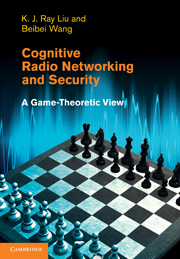Book contents
- Frontmatter
- Contents
- Preface
- Part I Cognitive radio communications and cooperation
- Part II Resource awareness and learning
- Part III Securing mechanism and strategies
- 15 Trust modeling and evaluation
- 16 Defense against routing disruptions
- 17 Defense against traffic-injection attacks
- 18 Stimulation of attack-resistant cooperation
- 19 Optimal strategies for stimulation of cooperation
- 20 Belief evaluation for cooperation enforcement
- 21 Defense against insider attacks
- 22 Secure cooperation stimulation under noise and imperfect monitoring
- References
- Index
21 - Defense against insider attacks
from Part III - Securing mechanism and strategies
Published online by Cambridge University Press: 06 December 2010
- Frontmatter
- Contents
- Preface
- Part I Cognitive radio communications and cooperation
- Part II Resource awareness and learning
- Part III Securing mechanism and strategies
- 15 Trust modeling and evaluation
- 16 Defense against routing disruptions
- 17 Defense against traffic-injection attacks
- 18 Stimulation of attack-resistant cooperation
- 19 Optimal strategies for stimulation of cooperation
- 20 Belief evaluation for cooperation enforcement
- 21 Defense against insider attacks
- 22 Secure cooperation stimulation under noise and imperfect monitoring
- References
- Index
Summary
In this chapter we present a game-theoretic analysis of securing cooperative ad hoc networks against insider attacks in the presence of noise and imperfect monitoring. By focusing on the most basic networking function, namely routing and packet forwarding, we model the interactions between good nodes and insider attackers as secure-routing and packet-forwarding games. The worst-case scenarios in which initially good nodes do not know which the attackers are while the insider attackers know which nodes are good are studied. The optimal defense strategies have been devised in the sense that no other strategies can further increase the good nodes' payoff under attacks. Meanwhile, the optimal attacking strategies and the maximum possible damage that can be caused by attackers are discussed. Extensive simulation studies have also been conducted to evaluate the effectiveness of the strategies.
Introduction
Many important issues about security in ad hoc networks have not yet been fully addressed. One is the optimality measure of defense mechanisms. For example, what metrics should be used to measure the optimality of the defense mechanism? Under certain optimality metrics, what are the optimal defending strategies, especially when the environment is noisy and the monitoring is not perfect? What strategies should the attackers use to maximize the damage to the network, and consequently what is the maximum possible damage that the attackers can cause?
Information
- Type
- Chapter
- Information
- Cognitive Radio Networking and SecurityA Game-Theoretic View, pp. 519 - 544Publisher: Cambridge University PressPrint publication year: 2010
